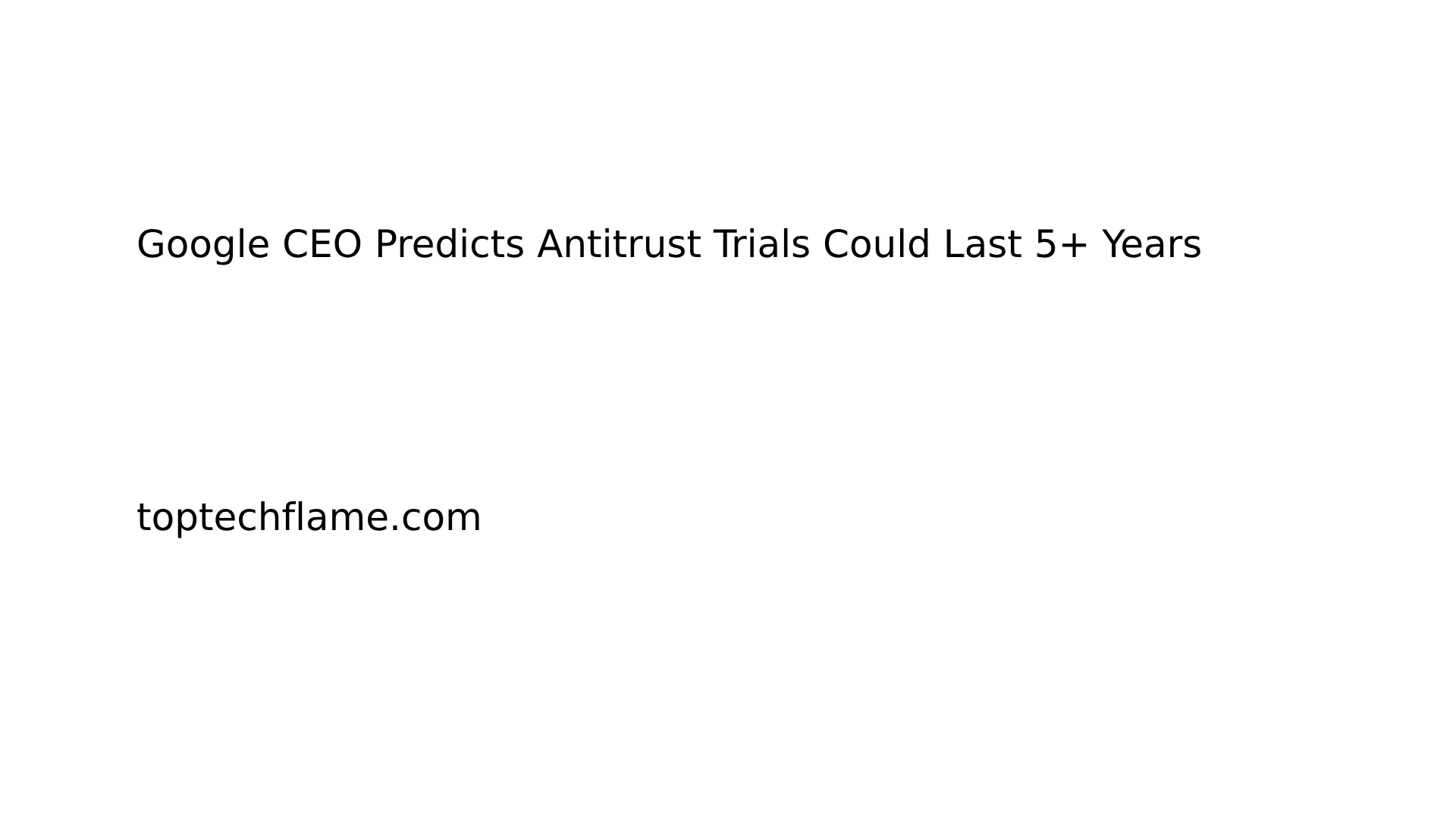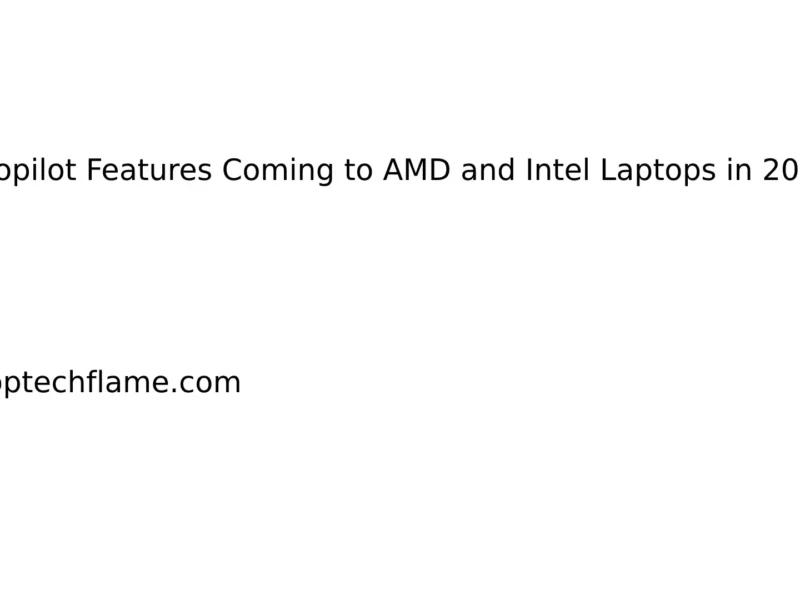Google CEO
Google CEO, Sundar Pichai, said something that will predict the future of the antitrust cases against Google. He claims these legal cases might take five and a half year to be complete. This prediction he made on David Rubenstein Show commonly referred to as Peer to Peer Conversations. With this, Google CEO has mentioned that Google might have to undertake a legal battle in the next couple of years.
The Nature of the Antitrust Trials
At the moment, Google is tightly connected with two large antitrust trials. On weak end, both the cases were filed by U.S. Justice Department. The first case alleges that Google is violating antitrust laws to monopolize the market of web search, the second one ,it monopolizes advertisement placement on the internet. Google has been in the cross hairs of regulators throughout the world for several years, but one peculiarity of the two current trials is that they constitute the first two legal actions against the company that have happened in the US.
Google Stance
The Google CEO was unanimous in stating that the company has a problem with the said allegations. Google CEO noted that Google also competing intensely and most of its innovations helpful for users globally. But he went on to add that Google would continue to actively do everything in its power to protect itself from the legal claims and suits.
Being dominant in the markets particularly in search and advertising business Google has become favourite among regulators. But the Google CEO is sure that his company has not violated any law.
Time frame for Resolution
As per the Google CEO such trials will not be got over soon. He noted that the entire legal directive could last for years and more if Google goes to appeal if it loses. However, Google CEO stated that the remedies stage of one of the cases is still image ongoing. This phase consists of the determination of whether Google should indeed be considered as guilty of the alleged offences and if it should, how its market domination should be corrected.

Google CEO Predicts Antitrust Trials Could Last 5+ Years
Appeal Process and Timeline
The Google CEO has mentioned that the process may take long and complicated depending on the case. He pointed to a recent win by Google when the company triumphed in an antitrust appeal nine big European Union members had leveled at the company demanding €1.5 billion ($1.7 billion) penalty. That appeal took over four years to finalization. This is a good word of advice that normally legal cases as this one involving Google which is a large corporate organization can take several years.
The Search Case
A final one of the main arguments against Google deals with its monopoly in the field of searching. Google was recently on the wrong end of this case where a judge ruled on behalf of the German exchange that Google had acted unreasonably by abusing its dominant market position.
The ruling was bad for Google, but this is not the end of legal prosecution for Google. Google CEO, said he was not in accord with the decision. He noted the fact Google planned to appeal the ruling, something he said would keep the case going for several more years.
Digital Advertising Case
The second is the digital advertising market connected with the allegation of Google dominance. This case is relatively new, trial process of which began just recently. According to the American authorities, Google CEO has created a monopoly in internet advertising and thus hinders competition. This means if the government triumph in this case, then it means Google will be compelled to sell parts of its advertising division.Google might appeal any such decision made against it, as was the case with the search scenario. Google CEO has said that the company is in for a long haul with respect to the issue.
The Impact of AI on the Cases
This, while the antitrust trials rage on, the tech landscape keeps shifting. One of the most dynamic is Artificial Intelligence AI and Google is at the helm of AI. Google CEO Sundar Pichai also added that by the time these trials are done, the state of technology will be significantly different. This becomes a challenge to the Justice Department because when making their case they must take into consideration the current technology. Google only lagged in July 2019 and that leadership position could reinforce Google in the future, which means that the outcome of these trials is even more unpredictable.
Regulation of the Major Technology Firms
Google CEO stated that when you are as large and powerful as Google is, you expect to receive attention. Markets really exert influence and come close to home through the multinational technology giants like Google, Meta, and Amazon among others. But despite that, Google CEO still looks at the brighter side of the future of Google. Google CEO is very positive minded when it comes to the future of the company and he confidently avers that if the company continues to place emphasis on the innovation, it will continue to record good sales in future.
Legal Challenges in Europe
The search giant Google has been keenly accused of violating anti-trust rules not only in the United States but across Europe as well. Several fines have been placed on the tech company by European regulators mainly in the market search and advertising, which give apprehensions over its anti-competitive conducts. These legal actions resemble the ones Google faces at the present in the United States for regulators analyze the company’s monopolistic positions in the market.
However, fine or not, Google CEO , Sundar Pichai is a happy man with where his company is headed. Pichai has said that very many of the fines which European regulators have levied on Google remain under appeal, and in a few cases that have been through the legal process, Google has prevailed.
Google CEO stressed that Google is ready to protect itself in each case, saying that the company’s actions are legal and appropriate. The appeals process enables Google to seek a reversal of, or a reduction in, the fines and sanctions that are levied on it in accordance with the rulings received from EU regulators.
The legal proceedings in Europe are relatively slow and lengthy Legal Proceedings in Europe: However, it is formulated and followed through slowly and laboriously. From the statement of Google CEO this is not surprising since even in Europe legal cases take several years due to the many different stages available in the courts of law mainly because of the many legal complexities and issues that are involved in handling the cases.
Google CEO is comfortably willing to wait for such extension and is ready to spend countless years in legal cases to defend its rights. It is also a long-term approach undertaken by the company’s strategy to substantiate every single case as vigorously as possible, which would be of great service in the courtroom.
The European cases have posed some problems to Google, but the company is not dreading to protect its operations. Google CEO have defended themselves by saying that their domination of the markets in search and advertisement is due to the superior quality of the services that they offer, and new innovations as opposed to unfair monopoly. Therefore, the company remains committed to defending the antitrust allegations and is willing to do it indefinitely.
Meanwhile, European regulators are not the only ones watching Google’s every move carefully. Other international bodies are equally investigating the company’s affairs, and there could be more legal cases. That Google is willing to meet these probes shows that the search giant has been willing to take a stand on regulatory investigations not only in the EU but other parts of the world as well.
All in all, although the legal process in Europe is prolonged and the cases are rather intricate, Google is ready to carry on appealing and advocating itself in every case. It will continue to address these challenges in the long run while maintaining the company’s business standards and its market stance.
Possible Outcomes of the Antitrust Trials
The head of Google has not said or made any statements about future prognosis of the trials. However, the risk factors are incredibly high. The penalty, if Google is to be defeated, could mean the company having to be split or sell off some of its most valuable assets. This would be a big set possible blow to the company. At the same time, the win for Google means its market dominance is further entrenched. In either case, these trials will change the shape of Google in the future – and not necessarily for the better.
Conclusion
Further, specifically before Google, the chief executive officer, Sundar Pichai, has said with equal clarity, that antitrust cases concerning the online search engine goliath are going to be on the radar, at least for a while. Pichai further expects that such legal cases because of issues that are complex for a decision and since appeal is likely, may take more than five years. These constant trials that are a great problem for the company are perceived as an essential evaluation of its capability to protect its activities. Yet, based on the experience which found Google coping with the legal complications of Internet, the company is not worried about encountering some troubles in the framework of the legislation.
The trials themselves are a major confrontation between Google and the US government albeit through the courts, they emerge as the key stage for this high profiled fight. Google is under much pressure for its control over the market share in the tech market in what concerns search engines and digital marketing, which has caused anti-trust issues. These allegations form the premise of the antitrust litigation processes since authorities attempt to ascertain whether Google has used its dominance to suppress competition.
The legal process is going to be time-consuming, and it may take years or more before the case is resolved, and the appeal will further complicate the process and therefore prosthetically take longer time. These trials are not going to be short or simple and Pichai’s statements show this he understands that. They will, instead, take years to resolve because of the highly legalistic and most likely protracted due to complicated nature of legal issues as well as the possibility of litigations in other courts. This extended timeline offers yet another element of risk because not only will Google and its competitors, but regulators as well will have to transition to a war that will span several years.
However, these trials can be quite challenging, and Google still holds the firm conviction that it has the capacity needed to defend itself adequately. The company has said that it complies with the laws on some of the issues and that its business has a lot of competitive advantages in terms of invention as opposed to unfair means. Google’s legal advisors are ready to prevent such actions by the government and try to debunk the accusations stating that Google took its dominant position on the market due to a set of perfectly legal endeavors.
Still, the trials are be expected to be a significant gauge of Google’s might. This pressure is not limited to sitting US regulators, but ‘acting’ ones and regulators in many other countries some of which are investigating Google business practices. These could be the parallel investigations that might make it even more complex for the company to handle putting it in a lot of trouble.
Looking into the future, the spotlight will continue to be on the courts, as the Google vs the US government saga plays on. Eve in these trials the results may not only affect Google but all the technological world out there in the future. There has been a lot of growth within the space expected from founding partners that have attracted the attention of relevant authorities even as furor for internet service escalates; if the government is victorious in its antitrust claims, large tech organizations may experience major alterations regarding their operation, therefore possibly shifting the competitive marketplace for years.
Finally, although Google is willing to protect its interests, there is ambiguity concerning the trials and their consequences in the future. Legal cases seem to remain part of Google future agenda since it has not been clearly stated how many more years this case could take. Seeing the details and the outcome of this case will be the best bet that everyone who is interested in watching will turn their attention to the courts.


